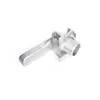Mobile:+86-311-808-126-83
Email:info@ydcastings.com
types of agitator impellers
Types of Agitator Impellers A Comprehensive Overview
Agitator impellers play a crucial role in various industries, including chemical processing, pharmaceuticals, and food production. Their primary function is to enhance fluid mixing, promote heat transfer, and facilitate chemical reactions. The design and type of impeller used can greatly influence the efficiency of these processes. This article explores the different types of agitator impellers, their applications, and the considerations for selecting the appropriate impeller for specific tasks.
1. Types of Agitator Impellers
Agitator impellers can be classified based on their design and operational principles. Here are some of the most common types
A. axial Flow Impellers
Axial flow impellers, such as the propeller and paddle designs, move fluid along the axis of the impeller. They are particularly effective in creating a uniform flow pattern and are widely used for mixing low-viscosity liquids.
- Propeller Impellers These are designed with blades that resemble a propeller and are excellent for applications requiring high flow rates and lower shear. They are commonly used in water treatment plants and in the mixing of dilute solutions.
- Paddle Impellers Paddle impellers have flat blades that can create a gentle mixing action, reducing shear stress on sensitive materials. They are often used in food and pharmaceutical industries where the integrity of the product is crucial.
B. Radial Flow Impellers
Radial flow impellers, such as turbine impellers and disc turbine types, move fluid in a radial direction away from the impeller’s center. This design is beneficial for achieving higher shear rates and promoting more intense mixing.
- Turbine Impellers These are characterized by a disk with multiple blades and are highly effective in generating turbulence. They are commonly utilized in chemical reactors where rapid mixing is essential for sufficient reaction rates.
- Disc Turbine Impellers These impellers feature flat blades and provide a high pumping capacity. They are widely used in applications like fermentation where thorough mixing is required to ensure even nutrient distribution.
types of agitator impellers

C. Mixers with Special Features
In addition to traditional designs, some impellers are engineered for specific applications or to improve performance.
- Anchor Impellers These impellers have a shape that allows them to scrape the vessel walls, ensuring maximum product mixing in highly viscous fluids. They are often employed in the production of adhesives and pastes.
- Helical or Screw Impellers The helical design provides a unique mixing action that encourages axial flow while also enhancing mass transfer. These impellers are used in applications such as polymer processing and certain food production processes.
2. Considerations for Selecting an Impeller
When selecting the suitable agitator impeller for a particular application, several factors must be considered
- Viscosity of the Fluid The viscosity of the fluid is a critical factor since it influences the choice of impeller design. Low-viscosity fluids typically require axial flow impellers, while high-viscosity fluids may mandate the use of more specialized designs like anchor or helical impellers.
- Mixing Requirements Understanding the end-goal of the mixing process is essential. Whether the aim is to achieve uniformity, promote heat transfer, or facilitate chemical reactions will guide the selection process.
- Tank Geometry The shape and size of the tank will also influence the selection of an impeller. Certain impeller designs work better with specific tank configurations, affecting the overall mixing efficiency.
- Power Consumption and Efficiency Different designs yield varying power consumptions based on their operational efficiency. Selecting an impeller that balances performance with energy consumption is essential for cost-effectiveness in industrial applications.
3. Conclusion
Agitator impellers are indispensable components in many industrial processes, influencing the effectiveness and efficiency of mixing operations. By understanding the different types of impeller designs and their applications, engineers can select the appropriate agitator impeller that aligns with the specific requirements of their processes. Ultimately, the right choice can lead to enhanced product quality, improved reaction times, and greater operational efficiency, underscoring the importance of this vital equipment in industrial applications.
-
Why Should You Invest in Superior Pump Castings for Your Equipment?NewsJun.09,2025
-
Unlock Performance Potential with Stainless Impellers and Aluminum End CapsNewsJun.09,2025
-
Revolutionize Your Machinery with Superior Cast Iron and Aluminum ComponentsNewsJun.09,2025
-
Revolutionize Fluid Dynamics with Premium Pump ComponentsNewsJun.09,2025
-
Optimizing Industrial Systems with Essential Valve ComponentsNewsJun.09,2025
-
Elevate Grid Efficiency with High-Precision Power CastingsNewsJun.09,2025











